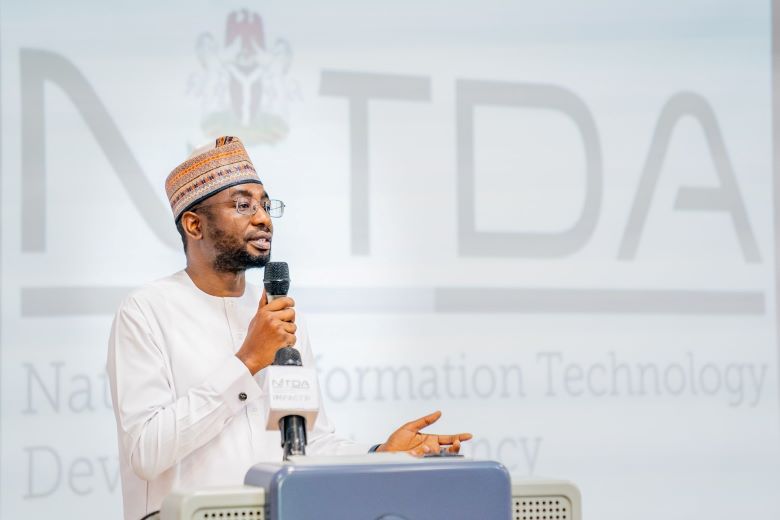The National Information Technology Development Agency (NITDA) Director General, Kashifu Inuwa, highlighted the possibility of collaborating between the security business and the startup ecosystem to enhance the efficacy and efficiency of Nigeria’s security sector.
These statements were delivered by Inuwa while hosting Alhaji A. S. Adeleke, Commandant of the National Institute for Security Studies (NISS), who was represented by Deputy Commandant D. E. Egbeji.
Faculty members and students from the Executive Intelligence Management Course (EIMC 17), which was held at the Public Service Institute of Nigeria (PSIN), Kubwa, Abuja, with the theme “Artificial Intelligence, Security, and Emerging Economies in Africa: Challenges and Prospects,” were present during the visit.
Inuwa emphasised the distinct methodologies of the information technology (IT) and security domains, emphasising that cooperation could leverage the extensive prospects presented by IT, encompassing the application of Artificial Intelligence (AI), the Internet of Things (IoT), and additional nascent technologies to fortify the security industry.
“The way you do things in Security is different from the way we do things in the Information Technology (IT) sector but if we can work together, we can make things better by utilising the numerous opportunities that IT offers to leverage AI, IoT and Emerging technologies in strengthening the security sector.”
Dispelling prevalent misconceptions, Inuwa emphasised that AI is a driving force internationally, highlighting its role in task simplification, quick answers, and solution provision. Dispelling prevalent misconceptions, Inuwa emphasised that AI is a driving force internationally, highlighting its role in task simplification, quick answers, and solution provision.
Based on capabilities, he divided artificial intelligence into three categories: general AI, deep learning AI, and narrow intelligence. Machines can beat humans in certain activities with narrow intelligence, while general artificial intelligence (AI) can learn and apply knowledge and deep learning AI uses neural networks, which are similar to the human brain.

Inuwa outlined four categories to further describe the capabilities of AI: Theory of Mind, Self-Awareness, Limited Memory, and Reactive Machines. Whereas Theory of Mind refers to systems that can comprehend human behaviour, Limited Memory stores and uses historical data for predictive analysis, and Reactive Machines only work with the data that is provided to them.
Through programmes like the National Centre for Artificial Intelligence and Robotics (NCAIR) and the continuing creation of the National Artificial Intelligence Policy, Inuwa continued, that the NITDA actively promotes the advancement of AI in Nigeria.
Inuwa expressed her openness to strategic collaboration and emphasised how these alliances support the goals of the NITDA Strategic Roadmap and Action Plan (SRAP 2.0), especially the pillar that deals with forming strategic alliances and collaborations. He underlined that cooperative partnerships will boost Nigeria’s digital endeavours and international visibility.
“We are open to strategic collaboration as it aligns with a pillar of the NITDA Strategic Roadmap and Action Plan (SRAP 2.0) which is to Forge Strategic Partnerships and Collaboration. And synergistic relationships will amplify Nigeria’s digital initiatives and global presence,” Inuwa added.
Commandant NISS Alhaji A.S. Adeleke responded by saying that the institute wanted to gain knowledge from NITDA’s experience to provide President Bola Ahmed Tinubu GCFR with an executive brief that was insightful. The purpose of this brief is to support the creation and application of policy.
“We are here to share from your experience and to gather all we can from the beginning of the course because at the end of the course, we are expected to make an executive brief to President Bola Ahmed Tinubu GCFR that will aid policy formulation and implementation,” Adeleke said.
Earlier, Director of Corporate Planning and Strategy Dr. Aristotle Onumo provided a thorough summary of NITDA’s development from the organization’s founding to the present. He examined the agency’s past significant events, tracing its evolution, expansion, and revolutionary projects across time.
He emphasised how NITDA’s dedication to promoting innovation, digital literacy, and technological growth has helped to shape and guide the course of information technology and development in Nigeria.

